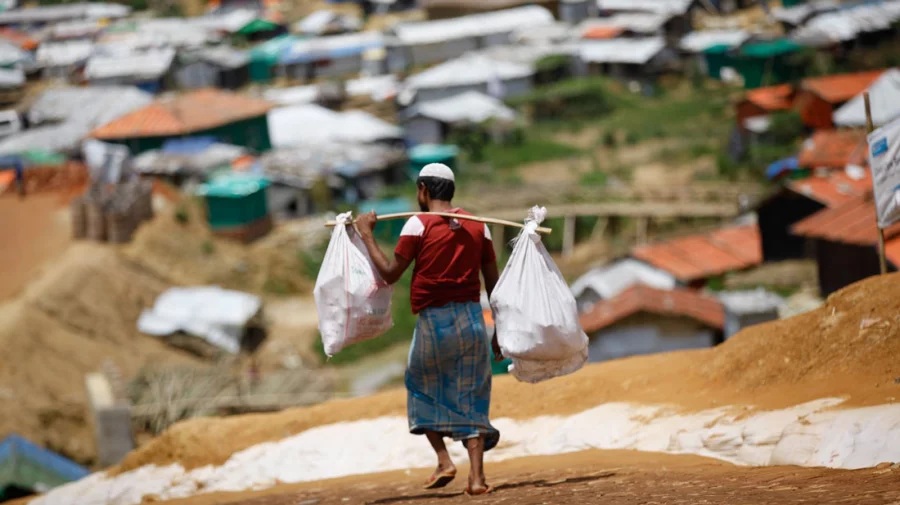A humanitarian corridor for Rakhine?
Dissecting the potentials and challenges-Nasir Uddin [Source : Dhaka Tribune, 08 May 2025]

The provision of a humanitarian corridor for Rakhine State has long been a topic of heated discussion in Bangladesh. Recently, the United Nations renewed its call for such a corridor, warning that without immediate humanitarian aid, the people living in Rakhine are at risk of severe famine. Delivering this aid is crucial to protect Rakhine’s civilians caught in the ongoing conflict between the Myanmar junta and the Arakan Army.
In response to the UN’s appeal, the interim government of Bangladesh has conditionally agreed to grant a “humanitarian corridor.” However, this decision has triggered widespread criticism from politicians, security analysts, regional stakeholders, and the general public. Concerns have been raised regarding national and border security, the potential for a renewed influx of Rohingya refugees, and the risk of Bangladesh becoming a hotspot for extremism, human trafficking, and illicit cross-border trade. This article examines the merits and demerits of granting a potential humanitarian corridor for Rakhine, ultimately highlighting a debate about the contestation between humanitarian consideration and geo-politics in South Asia.
There are ongoing debates about whether the incumbent Bangladeshi government consulted with political parties before deciding to provide a humanitarian corridor and whether the opinion of the Bangladesh Army was sought on this issue. The question of whether the interim government has the discretion and authority to make such a decision remains contentious. I will not delve into that debate because, first and foremost, even if Bangladesh wishes to provide a humanitarian corridor to Myanmar, it cannot do so without Myanmar’s agreement in principle. Furthermore, Myanmar is unlikely to agree since the Arakan Army would benefit from this arrangement, and Myanmar is unlikely to make any decision to strengthen the Arakan Army.
The key issue is that neither Bangladesh nor the UN can implement this without the consent of the Myanmar Army. Therefore, the situation is not as straightforward as it may appear. Setting aside the question of whether Bangladesh can act toward Myanmar or if the UN can execute plans even if Bangladesh offers them, I will briefly discuss the benefits and challenges of providing such a humanitarian corridor for Rakhine State.
First, if such a corridor were to be established to aid civilians in Rakhine State, Bangladesh will gain significant global applause, having already been praised for sheltering near about a million Rohingya in 2017. This would be a substantial benefit for the current interim government, enhancing its international image to further legitimate its position in power.
Second, if a positive relationship is fostered between Bangladesh and the Arakan Army through this humanitarian corridor, and if there is potential for replacing the military regime with a democratic government in Myanmar in the future, the establishment of this corridor could play a supportive and constructive role in the repatriation of Rohingya refugees residing in Bangladesh. While this hinges on numerous “ifs and buts,” it could be crucial for the future.
Third, through this humanitarian corridor -- under the auspices of the UN -- Bangladesh’s standing at the UN would be strengthened, further enhancing the positive image of the Bangladesh Army in global peacekeeping missions. This may lead to increased deployment of the Bangladesh Army to the UN. Since involvement in UN peacekeeping remains a significant factor in Bangladesh, establishing such a corridor would undoubtedly solidify Bangladesh’s position in UN peacekeeping policy.
Beyond these three potential benefits, my decade-long research engagement does not identify any other advantages for Bangladesh. Instead, I perceive that the challenges Bangladesh will face in providing such a humanitarian corridor could be extensive. I will discuss only three of the challenges.
First, establishing a humanitarian corridor without negotiations with Myanmar and the consent of the Myanmar military would put Bangladesh in a conflicting relationship with the country, potentially creating a warlike atmosphere that would not benefit Bangladesh. Any chance of war between Bangladesh and Myanmar could lead to dire consequences and incur significant costs for Bangladesh.
Second, a crisis would arise regarding security, particularly in regards to who will manage this corridor and oversee border security, raising significant questions. Opening this corridor could threaten Bangladesh’s national security and regional stability, which may appear to be bigger concerns. Additionally, it might be exploited to settle political scores in the West, including the United States, resulting in a major security crisis for Bangladesh. This situation could turn Bangladesh into a hub for global geopolitics at the expense of its citizens and their safety.
Third, facilitating such a corridor could create tension with two regional powers: China and India. Furthermore, there is a risk that the United States, with the support of the UN, might use this corridor to establish a new foothold in South and Southeast Asia, potentially deteriorating Bangladesh’s relations with both India and China.
Additionally, there is a strong probability of a renewed Rohingya influx in the borderlands of Bangladesh and Myanmar.
Finally, I believe that the extensive time and intellectual energy devoted by Bangladeshi media, intellectuals, educators, and noted security analysts to this humanitarian corridor issue may be disproportionate, given the complex realities. Historical precedent suggests that even with the best intentions from Bangladesh, the UN is unlikely to be able to easily establish such a corridor.
Moreover, even if Bangladesh was willing, the successful implementation of such a decision would face significant challenges at the international level, even within the UN framework. That said, the ongoing public debates, protests, and expressions of concern are vital. These conversations -- rooted in the protection of national sovereignty, security, and the public interest -- are both necessary and patriotic.
Public sentiment often plays a crucial role in shaping national decisions, and fostering this sentiment is a meaningful act of civic engagement. I sincerely hope the government recognises the importance of public opinion and takes decisions with careful consideration of people’s voices. Doing so will ultimately serve the best interests of both the nation and its citizens.